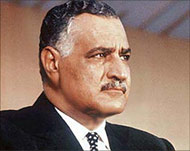Actor Ahmad Zaki dies
Acclaimed Egyptian actor Ahmad Zaki, who portrayed former Egyptian presidents Jamal Abd al-Nasir and Anwar al-Sadat on screen, has died of lung cancer.

The 55-year-old actor was diagnosed with lung cancer in January 2004.
Fans followed his treatment closely and anxiously, with his ups and downs making headlines in the Egyptian press. Zaki was hospitalised in April and July, undergoing chemotherapy in Paris last year.
Zaki had been in intensive care at Dar al-Fuad Hospital in Sixth of October City, just outside Cairo, where doctors speaking on condition of anonymity confirmed that he had died on Sunday.
Before slipping into a coma earlier this month, Zaki had received calls from President Husni Mubarak. Egypt’s most prominent celebrities and cultural figures had flocked to his hospital room for weeks before his death.
Zaki died before accomplishing one of his dreams – the making of the film Halim, about the life of the celebrated Egyptian singer and heart-throb of the 1950s through the ’70s, Abd al-Halim Hafidh.
The day production began in January, he spoke to his fans at a press conference: “I’ve been fighting a ferocious battle for a year against a damned illness, but you were with me. I love you and thank you very much.”
Natural instinct
Director Muhammad Khan, who worked with Zaki on six films, has compared him to Hollywood star Robert De Niro, saying he had a “natural instinct for acting”.
 |
|
Zaki’s portrayal of Jamal Abd al- |
“Even without the technical and other advanced means which Hollywood has, Zaki gave Egyptian film-making the glamour of real art,” Khan said.
Khan’s last film with Zaki was 1999’s Days of al-Sadat, depicting 40 years of the late president’s life.
Three years earlier, Zaki had starred in Nasir 56, a film that centred on the fateful summer of 1956, when then-president Nasir thumbed his nose at the West by nationalising the Suez Canal and sparked a war with Britain, France and Israel.
The two films played to full houses and sparked lively national debates, not only about the two leaders’ legacy but also about the dearth of modern-day Egyptian heroes in an era of political corruption and economic malaise.
Breaking barriers
Zaki broke colour barriers in Egyptian film-making, becoming the first black actor to play leading roles and picking up the nickname the Bronze Star. Before Zaki, black actors tended to portray secondary or comic roles.
Besides Nasir and al-Sadat, some of his most memorable roles included portraying a young boxer making a living in Europe in the The Black Tiger; a businessman who became a cabinet minister in a case of mistaken identity in His Excellency the Minister; and a high-security prison guard confused and shocked by the cruelty shown to political detainees in The Innocent.
|
“I’ve been fighting a ferocious battle for a year against a damned illness, but you were with me. I love you and thank you very much” Ahmad Zaki |
Zaki was born to a poor family in the Nile delta town of al-Zagazig on 18 November 1949. He started his professional career even before he graduated from the Cairo Higher Institute for Drama Studies in 1974. His first play was Hello Shalbi, a comedy.
His first big success came in the 1970s in School of Troublemakers, a play in which he appeared as Ahmad al- Shair, a young, romantic boy who is ridiculed by the school’s bullies. Zaki reprised the role in a sequel, The Kids Had Grown Up.
Children of Silence
Zaki’s said people in the street often hailed him as Ahmad al- Shair. He made his first film, Children of Silence, in 1974. By 1980 he had made six films, including Alexandria … Why? with Egypt’s best known director, Yusuf Shahin. Zaki appeared in more than 60 films.
He also starred in television serials, among them The Days, in which he played the renowned Egyptian writer and thinker Taha Husain.
Zaki was briefly married to the late actress Hala Fuad. He is survived by Haitham, his only son. Funeral arrangements were pending.